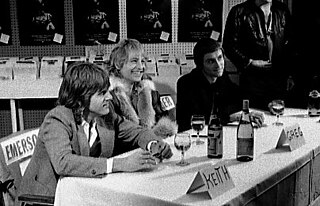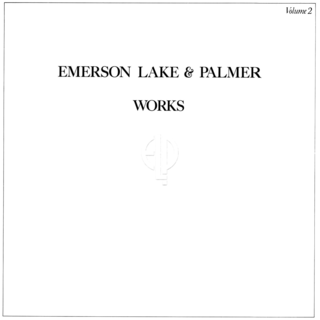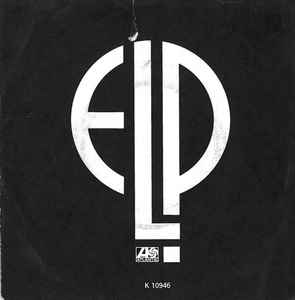Related Research Articles

Emerson, Lake & Palmer were an English progressive rock supergroup formed in London in 1970. The band consisted of Keith Emerson (keyboards) of the Nice, Greg Lake of King Crimson, and Carl Palmer of Atomic Rooster. With nine RIAA-certified gold record albums in the US, and an estimated 48 million records sold worldwide, they are one of the most popular and commercially successful progressive rock groups of the 1970s, with a musical sound including adaptations of classical music with jazz and symphonic rock elements, dominated by Emerson's flamboyant use of the Hammond organ, Moog synthesizer, and piano.

Keith Noel Emerson was an English keyboardist, songwriter, composer and record producer. He played keyboards in a number of bands before finding his first commercial success with the Nice in the late 1960s. He became internationally famous for his work with the Nice, which included writing rock arrangements of classical music. After leaving the Nice in 1970, he was a founding member of Emerson, Lake & Palmer (ELP), one of the early progressive rock supergroups.

Tarkus is the second studio album by English progressive rock band Emerson, Lake & Palmer, released on 14 June 1971 on Island Records. Following their debut tour across Europe during the second half of 1970, the group paused touring commitments in January 1971 to record a new album at Advision Studios in London. Greg Lake produced the album with Eddy Offord as engineer.

Peter John Sinfield is an English poet and songwriter. He is best known as a co-founder and former lyricist of King Crimson. Their debut album In the Court of the Crimson King is considered one of the first and most influential progressive rock albums ever released.

Brain Salad Surgery is the fourth studio album by English progressive rock band Emerson, Lake & Palmer, released on 7 December 1973 by their new record label, Manticore Records, and distributed by Atlantic Records.

Works Volume 1 is the fifth studio album by English progressive rock band Emerson, Lake & Palmer, released as a double album on 25 March 1977 on Atlantic Records. Following their world tour supporting Brain Salad Surgery (1973), the group took an extended break before they reconvened in 1976 to record a new album. They were now tax exiles and recorded new material in London and overseas in Montreux, Switzerland and Paris, France. Works Volume 1 features a side dedicated for each member to write and arrange their own tracks, while the fourth side features songs performed collectively. Keith Emerson recorded his Piano Concerto No. 1, Greg Lake wrote several songs with lyricist Peter Sinfield, and Carl Palmer recorded tracks of varied musical styles.

Works Volume 2 is the sixth studio album by Emerson, Lake & Palmer, released on 25 November 1977. Unlike Works Volume 1, Works Volume 2 was a single album compilation of leftover tracks from other album sessions, similar to the Who's Odds & Sods or Led Zeppelin's Coda. While many derided the album for its apparent lack of focus, others praised it for showing a different side of the band than usual, with blues, bluegrass and jazz being very prominent as musical genres in this recording.

Gregory Stuart Lake was an English musician, singer, and songwriter. He gained prominence as a founding member of the progressive rock bands King Crimson and Emerson, Lake & Palmer (ELP).

Trilogy is the third studio album by English progressive rock supergroup Emerson, Lake & Palmer, released in June 1972, by Island Records. The group had spent most of 1971 touring, and paused in September so they could record a new album at Advision Studios with Eddy Offord resuming his role as engineer. It would be his last with the group, as he later elected to work full-time with Yes. The album features "Hoedown", an arrangement of Aaron Copland's ballet composition which became a live favourite.

Manticore Records is a record label launched by the Manticore production company in 1973. These companies were owned by the members of the progressive rock group Emerson, Lake & Palmer and their manager, Stewart Young. The manticore was first featured in the artwork for the second ELP album Tarkus, as one of the eponymous creature's adversaries. Manticore was initially the name given to ELP's music publishers, credits first appearing in the credits on Trilogy, released on Island in 1972.

Emerson, Lake & Palmer is the debut studio album by English progressive rock band Emerson, Lake & Palmer. It was released in the United Kingdom by Island Records in November 1970, and in the United States by Cotillion Records in January 1971. After the group formed in the spring of 1970, they entered rehearsals and prepared material for an album which became a mix of original songs and rock arrangements of classical music. The album was recorded at Advision Studios in July 1970, when the band had yet to perform live. Lead vocalist and bassist/guitarist Greg Lake produced it.
"Tarkus" is the title track of Emerson, Lake & Palmer's second album. The progressive rock epic lasts 20:35. It was the longest studio suite by the band until the three impressions of "Karn Evil 9". The name "Tarkus" refers to the armadillo-tank from the William Neal paintings on the album cover. The artist has explained that the name is an amalgamation between 'Tartarus' and 'carcass'. Consequently, the name refers to the "futility of war, a man made mess with symbols of mutated destruction." The song "Tarkus" supposedly follows the adventures of Tarkus from his birth, through a fight with a manticore, which he loses and concludes with an aquatic version of Tarkus named "Aquatarkus". Keith Emerson, when asked what work he is proudest of, named his "Piano Concerto" and "Tarkus".

The Return of the Manticore is a 4-disc retrospective on the career of the band Emerson, Lake & Palmer. It was released in 1993, and features several new recordings of previously released songs, most notably a studio recording of "Pictures at an Exhibition," presented in Dolby Surround Sound. Also, a live recording of Dave Brubeck's "Rondo" features on disc 2; the track, although performed by ELP in concert from the band's inception, was previously unreleased on any live or studio album by ELP. This rendition was recorded at the Lyceum Theatre on December 9, 1970. The version of "Pirates" is a new, exclusive remix.

Emerson, Lake and Palmer in Concert is a live album by Emerson, Lake & Palmer (ELP), recorded at their 26 August 1977 show at the Olympic Stadium, Montreal, Quebec, Canada which is featured on the album cover. It was released by Atlantic Records in November 1979, following ELP's breakup. It was later re-released and repackaged as Works Live in 1993. Some of the tracks were not from the Montreal concert, but from other concerts during their 1977–1978 tour, such as "Peter Gunn" and "Tiger in a Spotlight".
Richard Fraser was a lyricist for the British progressive rock band Emerson, Lake & Palmer (ELP).

"Lucky Man" is a song by the English progressive rock supergroup Emerson, Lake & Palmer (ELP), from the group's 1970 self-titled debut album. Written by Greg Lake when he was 12 years old and recorded by the trio using improvised arrangements, the song contains one of rock music's earliest instances of a Moog synthesizer solo. "Lucky Man" was released as a single in 1970 and reached the top 20 in the Netherlands. The song also charted in the United States and Canada. The single was re-released in 1973 and charted again in the US and Canada.

"Fanfare for the Common Man" is an instrumental piece of music adapted and played by the English progressive rock band Emerson, Lake & Palmer, from the group's 1977 Works Volume I album. Adapted by Keith Emerson from Aaron Copland's 1942 piece of the same name, it is one of their most popular and enduring pieces.
"The Barbarian" is the opening track on the eponymous debut album of British progressive rock band Emerson, Lake & Palmer, released in 1970.
"Still...You Turn Me On" is a song by the progressive rock band Emerson, Lake & Palmer. It was released on their 1973 album Brain Salad Surgery. It is the only song on the album that lead singer and guitarist Greg Lake wrote entirely by himself.
"Piano Concerto No. 1" is a composition for piano and orchestra by the British musician Keith Emerson. It was released on the 1977 album Works Volume 1, by the progressive rock band Emerson, Lake & Palmer. The piece is 18 minutes long, and takes up the whole first side on the album.
References
- ↑ "ELP singles".
- ↑ "The Original Bootleg Series from the Manticore Vaults, Vol. 1 - Emerson, Lake & Palmer - Songs, Reviews, Credits - AllMusic". AllMusic.
- ↑ admin. "Emerson, Lake & Palmer - Works Volume 2 - CD Review". www.vintagerock.com.
- ↑ "Tiger in a Spotlight - Emerson, Lake & Palmer - Song Info - AllMusic". AllMusic.
- ↑ Stump, Paul (1997). The Music's All that Matters: A History of Progressive Rock. Quartet Books Limited. p. 218. ISBN 0-7043-8036-6.
- ↑ "Emerson, Lake & Palmer - Tiger In The Spotlight". www.pastemagazine.com.